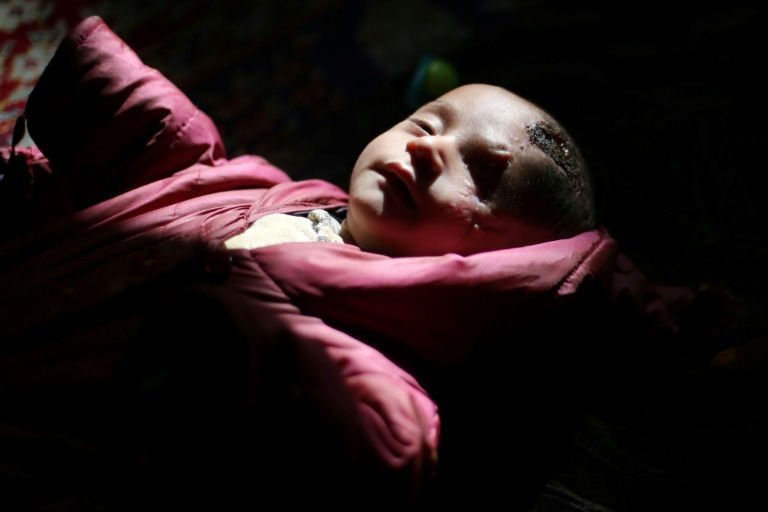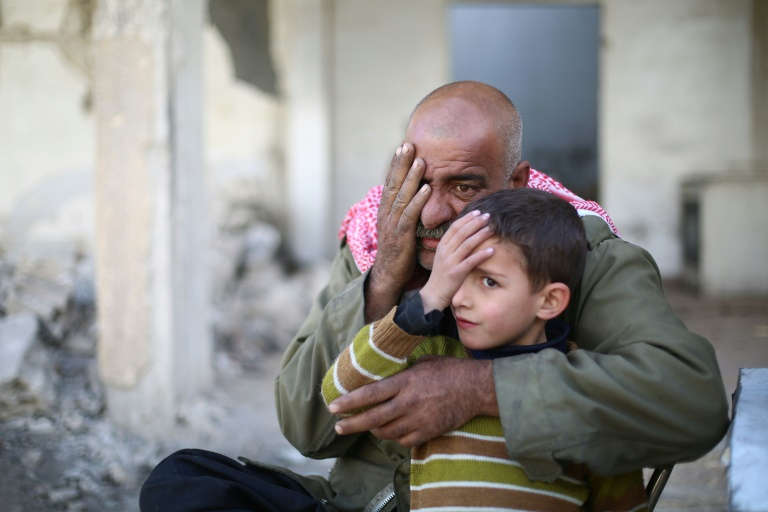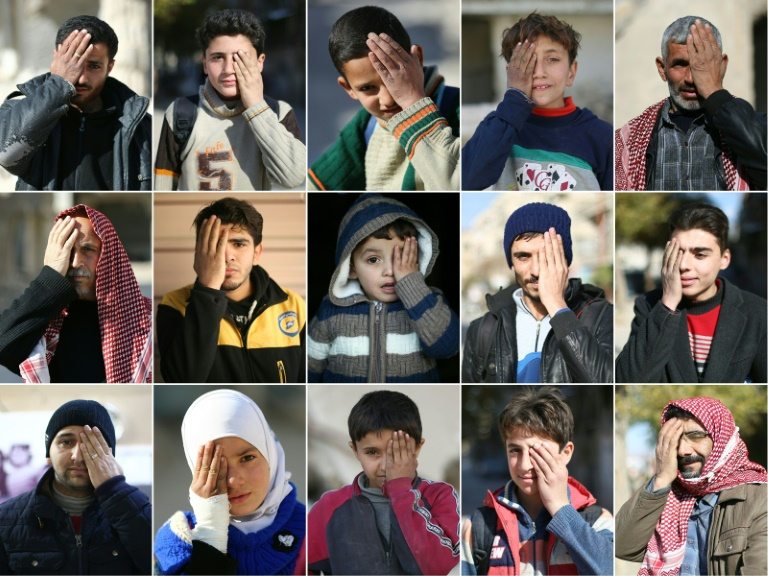
The heartrending photograph of a Syrian baby who lost an eye in an air strike has set off a viral social media campaign, with users sharing pictures of themselves covering one eye.
The shot depicts 40-day-old Karim Abdallah, wrapped in a puffy red jacket, with crescent-shaped scarring where his left eye should be and a dark red welt on his forehead.
An October 29 government air strike on a rebel bastion near Damascus severely wounded Karim and killed his mother, according to relatives and the doctor who treated him — and kicked off a worldwide support campaign.
Users are taking pictures of themselves covering one of their eyes and sharing them on Twitter and Facebook with the hashtag #SolidarityWithKarim.
The campaign even reached the United Nations, where British ambassador Matthew Rycroft tweeted a photograph of himself at the Security Council, his right hand over his eye.

“When we sit around the UNSC & warn that inaction will mean more people are going to die. More schools bombed. More children scarred. This is what we mean,” he wrote.
“We must see an end to the bombardment & siege of Eastern Ghouta.”
Government forces have besieged the rebel-held Eastern Ghouta region since 2013, restricting access to food and medicines for some 400,000 residents.
Eastern Ghouta is one of four “de-escalation” zones agreed in May in a bid to reduce fighting in some parts of the war-ravaged country, but the regime has ramped up bombing since mid-November.
‘It haunted me’
Photographs in solidarity with Karim have been posted by other Syrian children, journalists, activists and members of the White Helmets rescue service, which operates in rebel-controlled areas.
Government ministers in Turkey, a supporter of the rebels, also took up the cause.
“Even if the world remains silent, and nobody hears the screams from Syria, we will be the voice, eye and ear” of baby Karim, tweeted Culture and Tourism Minister Numan Kurtulmus.
The campaign was launched by Amer Almohibany, a freelance photographer in Eastern Ghouta and occasional AFP contributor.

“I visited the baby, and he made his mark on me even before taking his picture. It haunted me,” said Almohibany, 28.
In mid-December, he published a photograph he took of Karim, before taking a picture of himself with his hand over his eye.
“The goal of the campaign is to… bring to the world the voice of this baby, who lost his eye and his mother,” he said.
Almohibany was first inspired by Ghouta-based activist Qusay Noor, who posted an image in which he photoshopped his own eye out.
But he also drew inspiration from a similar campaign in support of five-year-old Buthaina Mansur, a Yemeni girl whose parents and five siblings were killed in a Saudi-led strike on Sanaa in August.
‘Assassinating childhood’
More than 340,000 people have been killed and half the country’s population displaced since Syria’s conflict broke out in 2011.
The raid that wounded Karim and killed his mother hit a market in Hammuriya, a town in Eastern Ghouta, on October 29.
The damage to his frontal lobe and left eye would likely leave him suffering long-term effects, said the brain surgeon who treated him and who identified himself as Abu Jamil.
“The frontal lobe plays an essential role in a human being’s comprehension, intelligence, and memory,” said the 50-year-old doctor.
“It’s treatable with behavioural and cognitive therapy… and cosmetic surgery, but not in Ghouta. If he could leave Syria, it would be different,” said Abu Jamil.
Over the years, several Syrian children have become powerful symbols of the civilian suffering brought on by the war.
Other iconic images have featured toddler Omran, who was photographed bloodied in an ambulance in second city Aleppo in 2016, and Aylan Kurdi, whose body washed up on a Turkish shore after his family tried to reach Europe by boat.
Karim’s father, who preferred not to give his real name, said the boy’s “aunt was taking care of him and is following up with his treatment in a hospital in Hammuriya.”
Eastern Ghouta activists have mobilised quickly to raise awareness of the humanitarian crisis in the region.
“We wanted to draw the world’s attention to the crimes committed by the Syrian regime against residents of besieged Eastern Ghouta,” said 24-year-old photographer Firas al-Abdallah.
“It’s assassinating childhood.”